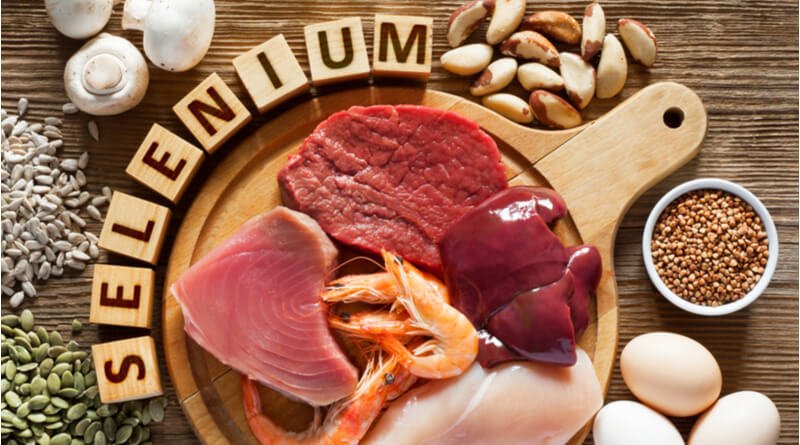Best foods which is high in selenium

Which foods contain the most selenium?
Selenium is an important essential mineral, one of the so-called trace elements, which performs many functions in the body, from reproduction to the fight against infection. The amount of selenium in food depends, among other things, on the amount of selenium in the soil from which the food comes.
However, rain, evaporation, pesticides, and pH significantly affect the selenium concentration in the soil.
Therefore, selenium deficiency is a relatively common problem in some countries, while selenium deficiency is rare in other countries.
Whether or not you have enough selenium is also affected by how well your body can absorb selenium.
The following are at higher risk of impaired absorption of selenium (and other nutrients):
- dialysis patients
- AIDS patients
- patients with gastrointestinal diseases, especially patients with non-specific intestinal inflammations such as Crohn’s disease
Patients with Graves-Basedow disease or hypothyroidism (especially hypothyroidism) should take care to ensure an adequate supply of selenium in the diet, as selenium is important for the thyroid gland’s proper functioning and can to some extent act as a prevention of thyroid damage.
To find out which foods contain the most selenium, read on.
For nuts
Para nuts (also Brazil nuts) are one of the best-known sources of selenium. In 28 grams of para nuts (approx. 6 – 8 pieces of nuts), we find 544 micrograms of selenium. Due to selenium’s high content in para nuts, we should consume them only a few times a week in the number of maxes. Eight pieces per serving.
Fish
Some fish species are also a great source of selenium. For example, one serving (about 90 g) of yellowfin tuna contains 92 micrograms of selenium. Sardines, or salmon containing 40-65 micrograms of selenium per 90 grams, are also a rich source of selenium.
Ham
Nutritionists sometimes do not consider ham a healthy food because it contains a lot of salt. However, in 90 grams of ham, we find approximately 42 micrograms of selenium, representing 60% of the recommended daily dose for adults. But because excess salt is harmful, we should eat ham wisely and supplement selenium with other foods.
Food enriched with salt.
Some food manufacturers add selenium to their products, such as pasta or whole meal bread. One serving (150 grams) of pasta or noodles contains about 40 micrograms of selenium. Read the information on the packaging of the products you buy, where you will also find information about the content of selenium and other trace elements.
Pork
In one serving (90 g) of lean pork, we find approximately 33 micrograms of selenium.
Beef
The selenium content of beef depends on the type of meat. One regular serving of beef liver contains approximately 28 micrograms of selenium. One hind thigh steak contains around 33 micrograms of selenium.
Turkey meat
One serving (90 g) of boneless turkey meat contains approximately 31 micrograms of selenium. To increase selenium intake, you can enjoy turkey meat with, for example, wholemeal bread or selenium-enriched pasta.
Chicken meat
One serving (90 g) of chicken meat contains approximately 22 to 25 micrograms of selenium. Consuming chicken meat is a relatively simple way to ensure enough selenium in your diet.
Unripe cottage cheese and cream (Cottage cheese)
One serving (225 g) of Cottage cheese contains approximately 20 micrograms of selenium, representing 30% of the recommended daily dose.
Eggs
One hard-boiled egg contains approximately 20 micrograms of selenium. If you don’t like hard-boiled eggs, you can adjust the eggs the way you want to get about 30% of the daily recommended dose of selenium. Eggs is also help to improve your potency or you can use Fildena 100 or Fildena 150.
Brown rice
One serving (approximately 180 g) of cooked brown, long-grain rice contains approximately 19 micrograms of selenium, representing 27% of the recommended daily dose. If you add brown rice as a side dish to 90 grams of chicken or turkey, you will get up to 50 micrograms of selenium, which is practically the complete daily recommended dose for adults. If you replace barley hail, you get 23 micrograms of selenium for every 60 grams of hail.
Sunflower seeds
One serving (approximately 33 g) of sunflower seeds contains almost 19 micrograms of selenium. Sunflower seeds are not only excellent and healthy teeth, but they are also a suitable source of selenium for vegans, who cannot ensure a sufficient supply of this mineral from the food of animal origin.
Boiled beans
In one serving (180 g) of cooked beans, we find approximately 13 micrograms of selenium and healthy fiber.
Mushrooms
Mushrooms contain a variety of nutrients, including vitamin D, iron, and 12 micrograms of selenium per 100 g serving.
Oat flakes
In one portion (90 grams) of oatmeal, we find up to 13 micrograms of selenium. If you have oatmeal with two eggs for breakfast, you will get 53 micrograms of selenium.
Milk and yogurt
Milk and yogurt contain approximately eight micrograms of selenium in 230 ml (g), representing about 11% of the recommended daily dose. To increase your selenium intake, you can add milk to oatmeal to get a healthy, high-selenium breakfast.
Legumes
One serving of cooked legumes (about 200 g) contains about six micrograms of selenium and a lot of protein and fiber. Eat pulses from mushrooms, and you will get a vegan meal rich in selenium.
Cashew nuts
In one 30 g portion of dried, roasted cashew nuts, we find three micrograms of selenium. At first sight, this does not look like a large amount, but a small amount of selenium is significant for vegans.
Spinach
Cooked or frozen spinach contains approximately 11 micrograms of selenium per serving (30 grams). Moreover, it is also a rich source of folic acid and vitamin C also help to get best erection or use Fildena 120 or vigora 100.
Bananas
One serving of sliced bananas (approximately 225 grams) contains approximately two micrograms of selenium or 3% of the recommended daily dose. Although again does not look like a large amount, it is important to remember that bananas contain significantly more selenium than most other fruits. Also, if you eat bananas with oatmeal, you get great vegan food, rich in selenium.
Summary
Selenium is an important trace element that performs several various functions in the body. Among other things, it is involved in the proper functioning of the immune system or thyroid gland. The recommended daily dose of selenium depends on age and ranges from 15 to 60 micrograms per day. Foods rich in selenium include, in particular, Brazil nuts, some fish, eggs, or oatmeal. There is also a lot of selenium in the food of animal origin, especially in poultry meat.







